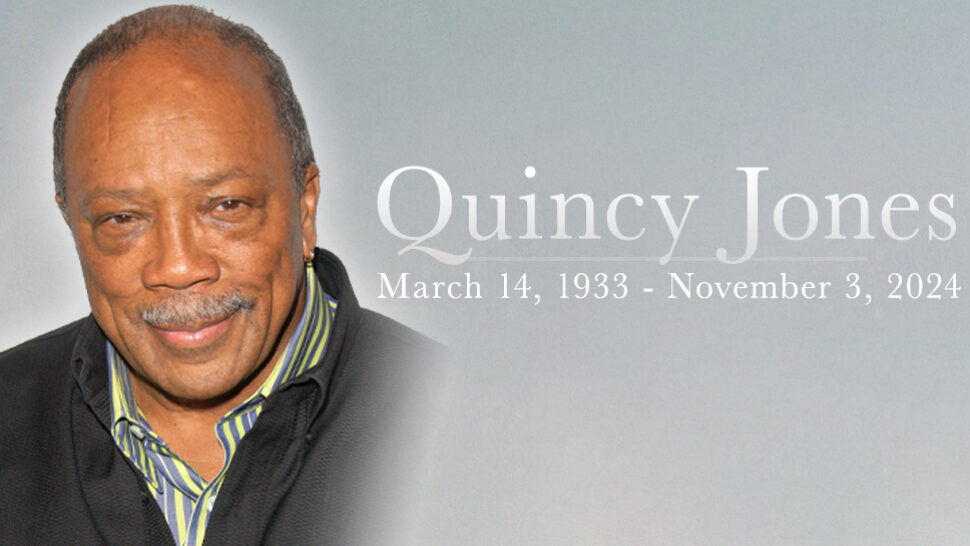In the world of music, few figures have left as profound and lasting an impact as Quincy Jones. Revered as one of the most influential music producers, composers, and arrangers of all time, Quincy’s passing at the age of 91 marks the end of an era. Known for his exceptional versatility, his ability to cross musical boundaries, and his collaborations with legends across genres, Jones brought a rare combination of creativity, technical mastery, and cultural insight. His death has resonated deeply within the music industry and beyond, prompting a global reflection on the legacy he leaves behind. His work spanned genres, reshaped pop culture, and opened doors for countless artists, many of whom continue to carry forward the influence of his genius. Follow us here at All the Best Arrivals Photos at the 2024 LACMA Art + Film Gala.
Quincy Jones
Born on March 14, 1933, in Chicago, Illinois, Quincy Delight Jones Jr. grew up surrounded by the richness of jazz and blues, and he quickly found his passion for music. From his early days, his drive to make music pushed him to master multiple instruments, particularly the trumpet, and develop a sharp ear for arrangement and composition. Jones’s career took flight when he began performing with jazz greats like Lionel Hampton and Dizzy Gillespie, and it wasn’t long before his unique talent for music production was noticed. Moving to Paris to study under famed composer Nadia Boulanger, Jones expanded his musical vocabulary and gained a deep understanding of classical and avant-garde techniques, which he later infused into his jazz and pop work.

Quincy Jones’s career skyrocketed in the 1960s, a time that saw him collaborating with icons like Frank Sinatra on the classic Sinatra at the Sands album, an influential live performance collection that demonstrated his knack for creating cohesive, emotionally charged recordings. His ability to bridge diverse musical worlds allowed him to work with a wide range of artists, from Ray Charles and Count Basie to Paul Simon and Aretha Franklin, all while shaping the popular sound of each era he touched. For a period, Jones also served as an executive at Mercury Records, becoming one of the first African Americans to hold a high-ranking position at a major label. This milestone not only signified his achievement but also broke barriers within the industry, paving the way for future generations of Black musicians and producers.
Related: Wicked Premiere in Australia
Related: Yellowstone Season 5 Part 2
The Legacy of an American Record Producer Genius
Quincy Jones' legacy is not only etched in the iconic albums and unforgettable songs he produced but also in the impact he had on future generations of musicians and producers. Jones pushed boundaries in production, often blending genres to create a distinctive sound. His genius lay in his ability to balance innovation with accessibility, creating music that was both sophisticated and broadly appealing. He was known for meticulously crafting every element of a song, from arranging orchestras to incorporating cutting-edge recording techniques. His influence extended beyond music as well, as he became one of the first African-American music producers to achieve such unprecedented success in a largely segregated industry.

Throughout his life, Jones remained an advocate for diversity and inclusivity within the music industry, founding initiatives to support emerging artists and minority representation in music and media. He championed opportunities for Black artists in mainstream media, recognizing the importance of representation long before it became a larger cultural conversation. His impact on film scores is also noteworthy, as he scored numerous films, including The Color Purple and In the Heat of the Night. His scores contributed to the emotional depth of these films, helping to bring complex narratives to life through music.

Jones' legacy is not confined to the past, however. His contributions to music production have influenced an array of contemporary genres, from hip-hop to electronic music, with many modern producers citing him as a fundamental influence. Producers today continue to draw inspiration from his innovative approach to layering sounds and his dedication to high-quality production. Young artists frequently revisit his works for both inspiration and technical guidance, keeping his spirit alive in today’s music industry.
A Life Defined by Music
The influence of Quincy Jones on today’s music landscape is unmistakable. His groundbreaking work with genre-crossing and fusion techniques has paved the way for modern artists to explore new soundscapes and experiment with traditional boundaries. Artists like Bruno Mars, Kendrick Lamar, and Pharrell Williams have all acknowledged Jones' influence on their approach to music production and arrangement. The current trend of blending genres, whether it's pop with R&B or hip-hop with jazz, is in many ways a continuation of Jones' philosophy. His insistence on creating music that resonates universally is something that today’s musicians are increasingly embracing in their work, demonstrating his timeless impact.
Looking to the future, Quincy Jones’ legacy will likely continue to inspire musicians, producers, and industry professionals. His ability to connect deeply with diverse audiences and cultures set a standard that resonates strongly in an increasingly globalized world. The Quincy Jones Music Consortium, an organization he helped establish, will further his dedication to educating young artists and encouraging musical diversity. Additionally, his impact on technology in music production will endure, as digital platforms continue to adapt methods Jones pioneered to help artists reach wider audiences.
Jones also leaves behind a family of musicians and artists who carry on his vision. His daughter, actress and producer Rashida Jones, has taken on projects that align with her father’s values of inclusivity and artistic integrity. The musical legacy he leaves will continue through the efforts of his family, fans, and those he mentored throughout his life. The industry Jones helped shape will no doubt continue to evolve, but his profound influence will remain a benchmark for generations to come.